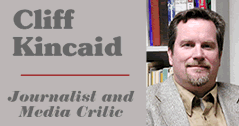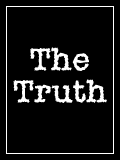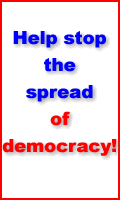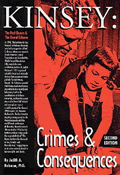Other
Kincaid
Articles:
By Cliff Kincaid
March
1, 2006
NewsWithViews.com
The initial outcry from the conservative blogs and talk radio over an Arab state-owned company taking over terminals at some U.S. ports seems to have subsided, as the Bush Administration, the Arab/Muslim lobby and their representatives and lobbyists have moved quickly to dominate the media debate.
The firm, Dubai Ports World, is owned by the United Arab Emirates, an Islamic regime that is now being regularly described in the media as a U.S. ally. But the democracy we�re fighting for in Iraq does not exist in the UAE. Inside the UAE, according to the State Department, there is no freedom of the press and Internet access is restricted.
Sunni Islam is the official religion and the International Religious Freedom Report of 2004 says that while non-Muslims in the country are free to practice their religion, �they are subject to criminal prosecution, imprisonment, and deportation if found proselytizing or distributing religious literature to Muslims.�
In addition to the expensive lobbyists who have been deployed on Capitol Hill in support of the deal, Ibrahim Hooper of the Council on American-Islamic Relations (CAIR) has been appearing on cable television to insist that opposition is based on anti-Arab racism. But the media have failed to note that CAIR has strong financial ties to the UAE.
Paul Sperry, author of the blockbuster book Infiltration, points out that CAIR entered into a �Deed of Trust� contract with the Al-Maktoum Foundation of the UAE, which put up the nearly $1 million for its property in Washington, D.C. Sperry called the UAE government CAIR's �benefactor.� CAIR specializes in driving critics of Islam off talk radio. Michael Graham was fired from WMAL- radio in Washington, D.C. for offending CAIR.
Some of the negative reaction to the deal stems not from racism or Arab-bashing but the fact that initial federal approval of the deal sidestepped a legally authorized 45-day investigation. The law requires such a probe when �the acquirer is controlled by or acting on behalf of a foreign government� and when the acquisition �could result in control of a person engaged in interstate commerce in the U.S. that could affect the national security of the U.S.� By reluctantly agreeing to have a 45-day investigation, Dubai Ports World only recognized what the law required.
The skirting of the law has enabled critics of the deal, such as Lou Dobbs of CNN, to suggest that Bush family ties to the UAE are involved. CNN reporter Christine Romans did a report on Dobbs� show alleging that the President�s brother, Neil Bush, has reportedly received funding for his educational software company from UAE investors. Neil Bush, however, is a loose cannon in the Bush family, and recently showed up on a tour with controversial Korean cult leader Sun Myung Moon after going through a messy divorce. It�s hard to believe that this black sheep of the Bush family would have that much influence. If there is a connection between Neil Bush and the deal, the controversy could quickly turn into �Portgate.�
One curious fact that emerges in the controversy is that a Dubai Ports World executive, David Sanborn, was nominated by President Bush to serve as U.S. Maritime Administrator in late January?before the ports deal was revealed. It seems like strange timing, to say the least.
Despite claims that the UAE is a U.S. ally in the war on terrorism, the director of the Institute for Gulf Affairs, Ali Al-Ahmed, told the New York Sun that in addition to being a staging point for the 9/11 terrorists and a country where Al Qaeda laundered money, the UAE �has been fueling the insurgency in Iraq. They have hosted a lot of the Sunni insurgent supporters and Sunni insurgents.� Equally ominous, a captured al-Qaeda document released by the Center for Combating Terrorism at West Point shows that the terrorist organization has boasted that it has �infiltrated� the security apparatus and other agencies of the UAE regime.
Dubai is also home to the Arab satellite channel al-Arabiya, which is not as well known as Al-Jazeera but was temporarily ordered out of Baghdad in 2003 by the post-Saddam government after it was accused of inciting violence against innocent citizens and American military personnel.
In terms of the media war being waged here at home, one blogger, Glenn Reynolds of Instapundit.com, said on CNN�s Reliable Sources show that while he was initially critical of the deal, ��I am now reasonably comfortable with it.� He said he reacted negatively after reading one article about the deal in the New York Post but then talked to some other people who allayed his concern. �At least having looked into port security in general,� he continued, �I would say that our ports are so insecure everywhere that this isn't likely to make much of a difference.�
|
Subscribe to the NewsWithViews Daily News Alerts! |
This
does not seem like much of an endorsement of the deal but it does
serve as an indictment of the unreliability of quick-witted bloggers.
Reynolds should not have thrown in the towel so quickly. He may find
he has to reverse himself once again.
� 2006 Cliff Kincaid - All Rights
Reserved
Cliff Kincaid, a veteran journalist and media critic, Cliff concentrated in journalism and communications at the University of Toledo, where he graduated with a Bachelor of Arts degree.
Cliff has written or co-authored nine books on media and cultural affairs and foreign policy issues.
Cliff has appeared on Hannity & Colmes, The O�Reilly
Factor, Crossfire and has been published in the Washington Post, Washington
Times, Chronicles, Human Events and Insight.
Web Site: www.AIM.org
E-Mail: kincaid@comcast.net
Dubai is also home to the Arab satellite channel al-Arabiya, which is not as well known as Al-Jazeera but was temporarily ordered out of Baghdad in 2003 by the post-Saddam government after it was accused of inciting violence against innocent citizens and American military personnel.













